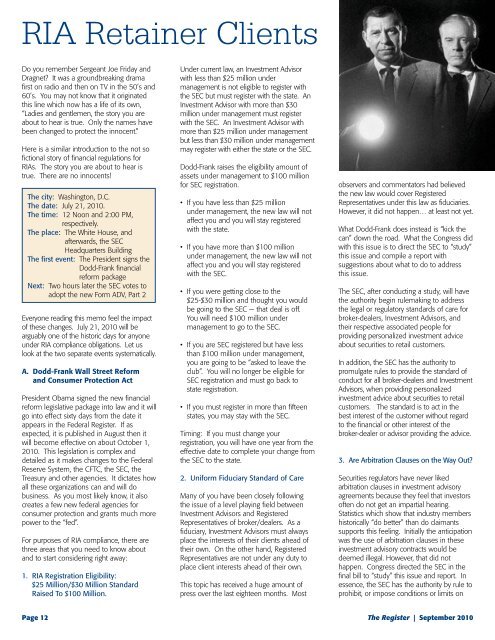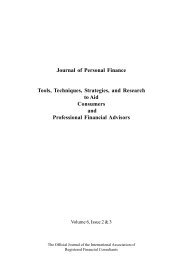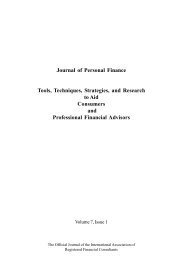Vol. 11 Iss. 9 - iarfc
Vol. 11 Iss. 9 - iarfc
Vol. 11 Iss. 9 - iarfc
You also want an ePaper? Increase the reach of your titles
YUMPU automatically turns print PDFs into web optimized ePapers that Google loves.
RIA Retainer Clients<br />
Do you remember Sergeant Joe Friday and<br />
Dragnet? It was a groundbreaking drama<br />
first on radio and then on TV in the 50’s and<br />
60’s. You may not know that it originated<br />
this line which now has a life of its own,<br />
“Ladies and gentlemen, the story you are<br />
about to hear is true. Only the names have<br />
been changed to protect the innocent.”<br />
Here is a similar introduction to the not so<br />
fictional story of financial regulations for<br />
RIAs. The story you are about to hear is<br />
true. There are no innocents!<br />
The city: Washington, D.C.<br />
The date: July 21, 2010.<br />
The time: 12 Noon and 2:00 PM,<br />
respectively.<br />
The place: The White House, and<br />
afterwards, the SEC<br />
Headquarters Building<br />
The first event: The President signs the<br />
Dodd-Frank financial<br />
reform package<br />
Next: Two hours later the SEC votes to<br />
adopt the new Form ADV, Part 2<br />
Everyone reading this memo feel the impact<br />
of these changes. July 21, 2010 will be<br />
arguably one of the historic days for anyone<br />
under RIA compliance obligations. Let us<br />
look at the two separate events systematically.<br />
A. Dodd-Frank Wall Street Reform<br />
and Consumer Protection Act<br />
President Obama signed the new financial<br />
reform legislative package into law and it will<br />
go into effect sixty days from the date it<br />
appears in the Federal Register. If as<br />
expected, it is published in August then it<br />
will become effective on about October 1,<br />
2010. This legislation is complex and<br />
detailed as it makes changes to the Federal<br />
Reserve System, the CFTC, the SEC, the<br />
Treasury and other agencies. It dictates how<br />
all these organizations can and will do<br />
business. As you most likely know, it also<br />
creates a few new federal agencies for<br />
consumer protection and grants much more<br />
power to the “fed”.<br />
For purposes of RIA compliance, there are<br />
three areas that you need to know about<br />
and to start considering right away:<br />
1. RIA Registration Eligibility:<br />
$25 Million/$30 Million Standard<br />
Raised To $100 Million.<br />
Under current law, an Investment Advisor<br />
with less than $25 million under<br />
management is not eligible to register with<br />
the SEC but must register with the state. An<br />
Investment Advisor with more than $30<br />
million under management must register<br />
with the SEC. An Investment Advisor with<br />
more than $25 million under management<br />
but less than $30 million under management<br />
may register with either the state or the SEC.<br />
Dodd-Frank raises the eligibility amount of<br />
assets under management to $100 million<br />
for SEC registration.<br />
• If you have less than $25 million<br />
under management, the new law will not<br />
affect you and you will stay registered<br />
with the state.<br />
• If you have more than $100 million<br />
under management, the new law will not<br />
affect you and you will stay registered<br />
with the SEC.<br />
• If you were getting close to the<br />
$25-$30 million and thought you would<br />
be going to the SEC — that deal is off.<br />
You will need $100 million under<br />
management to go to the SEC.<br />
• If you are SEC registered but have less<br />
than $100 million under management,<br />
you are going to be “asked to leave the<br />
club”. You will no longer be eligible for<br />
SEC registration and must go back to<br />
state registration.<br />
• If you must register in more than fifteen<br />
states, you may stay with the SEC.<br />
Timing: If you must change your<br />
registration, you will have one year from the<br />
effective date to complete your change from<br />
the SEC to the state.<br />
2. Uniform Fiduciary Standard of Care<br />
Many of you have been closely following<br />
the issue of a level playing field between<br />
Investment Advisors and Registered<br />
Representatives of broker/dealers. As a<br />
fiduciary, Investment Advisors must always<br />
place the interests of their clients ahead of<br />
their own. On the other hand, Registered<br />
Representatives are not under any duty to<br />
place client interests ahead of their own.<br />
This topic has received a huge amount of<br />
press over the last eighteen months. Most<br />
observers and commentators had believed<br />
the new law would cover Registered<br />
Representatives under this law as fiduciaries.<br />
However, it did not happen… at least not yet.<br />
What Dodd-Frank does instead is “kick the<br />
can” down the road. What the Congress did<br />
with this issue is to direct the SEC to “study”<br />
this issue and compile a report with<br />
suggestions about what to do to address<br />
this issue.<br />
The SEC, after conducting a study, will have<br />
the authority begin rulemaking to address<br />
the legal or regulatory standards of care for<br />
broker-dealers, Investment Advisors, and<br />
their respective associated people for<br />
providing personalized investment advice<br />
about securities to retail customers.<br />
In addition, the SEC has the authority to<br />
promulgate rules to provide the standard of<br />
conduct for all broker-dealers and Investment<br />
Advisors, when providing personalized<br />
investment advice about securities to retail<br />
customers. The standard is to act in the<br />
best interest of the customer without regard<br />
to the financial or other interest of the<br />
broker-dealer or advisor providing the advice.<br />
3. Are Arbitration Clauses on the Way Out?<br />
Securities regulators have never liked<br />
arbitration clauses in investment advisory<br />
agreements because they feel that investors<br />
often do not get an impartial hearing.<br />
Statistics which show that industry members<br />
historically “do better” than do claimants<br />
supports this feeling. Initially the anticipation<br />
was the use of arbitration clauses in these<br />
investment advisory contracts would be<br />
deemed illegal. However, that did not<br />
happen. Congress directed the SEC in the<br />
final bill to “study” this issue and report. In<br />
essence, the SEC has the authority by rule to<br />
prohibit, or impose conditions or limits on<br />
Page 12 The Register | September 2010

















